Has Hustle Culture Commandeered Our Vacations?
On slow travel, consumerism, and experiencing the soul of a place
In February of 2023, I took my first ever trip just for me. I had always dreamed of visiting Portugal for its rich history, architecture, language, and culture. After spending most of my life as a broke post-secondary student, and then finally having a job with good earnings but a global pandemic to keep me at home, I was finally able to book the trip of my dreams. I was going to Lisbon and I was going alone, for three weeks, to discover the city as fully as I could.
It was in the process of booking this trip that I started to uncover the way that hustle culture had embedded itself into our holidays. I wanted a vacation, but I wanted an experience that did not feel rushed or pressured. I was only planning on going to Lisbon and surrounding areas like Sintra, Nazare, and Obidos.
Every person I told about my laid-back trip had the same response:
“You’re there for three whole weeks, aren’t you going to also go to Spain or France?”
Is three weeks truly a long time, or has it been decided by the media and our own fast-paced lives that we need to take in as much as we can with every second of a trip?
I started to second-guess myself. Perhaps I should book a train ride down to Faro or a bus up to Porto, maybe by week two I’ll be bored and I’ll fly over to Valencia. Should I book some tours and experiences in advance?
I thought about some of my friends who backpacked Europe, visiting a new city every few days. I thought about others who booked guided trips with each day full of exciting sights and experiences. As a neurodivergent woman who struggles with frequent changes to my surroundings, the idea of filling up my days in advance, and hopping from city to city, sounded like a nightmare (though absolutely no judgement to those who enjoy these excursions).
I spent all year at work rushing to meet deadlines, using my spare time to cram in fitness, tea with friends, cleaning my home, and somehow trying to also achieve enlightenment with 10 minutes of meditation before bed.
After years of being an over-achiever, I finally decided that I was not going to be rushed unless I was getting paid to rush. Especially for a trip.
Why would I want to rush a time that is intended to be exploratory and replenishing? To say that I had seen everything on the Lonely Planet suggested travel list? To fit the mold of what society expects a trip to look like?
I want to soak in the life of a place and let it nestle into my bones. I want that romantic nostalgia when I think back to my time somewhere. I want it to be filled with people I met, flavours I tasted, surprising things that I saw, and the smells of fish or coriander that waft through streets lined with restaurants and markets.
I knew that I wanted to go to Lisbon, and that I would be happy to take my time soaking in the city, making friends, sipping 1€ espresso, and writing while watching sunsets from one of the famous miradouros that line the city’s hilly peaks. I would go with only my accommodation booked, and let my days and week be filled with whatever Lisbon had to offer.
But there was something else to my decision as well: I didn’t want to just see the sights, I wanted to see the soul of the place.
Cities and towns are not just places to see, they are living organisms that we interact with. They have souls, an energy, and a history. The veins of a city move through its public transport, and bicycles carrying students and workers. The bones are the buildings that have withstood countless events, rituals, and mundane daily activities. The flesh of a city is its arts and culture, making its face unique to the world.
Lisbon’s veins run with trollies and street cable cars taking you up and down those scenic streets while people speak Portuguese, Spanish, and a large smattering of musical Brazilian dialects (oh, how I love this dialect).
Lisbon’s bones are made up of azulejos; the iconic painted tiles that pepper the bulk of the buildings in the city. Then are the famous stone-tiled streets, laid tirelessly by thousands of workers over hundreds of year.
The flesh of Lisbon can be heard in both its traditional fado folk music or Portuguese pop songs bursting out of restaurants, shops, and coffee stands in the park; it’s drag queens in the local gay bar; it‘s the friend of your AirBnB host inviting you both into her closed restaurant for a glass of wine.
This discovery of a culture’s soul is hard to find in a check list or a rushed travel itinerary. This is what I mean when I speak of the commodification of travel; we get snippets but we do not give ourselves the time and space to dive in.
We have allowed hustle culture mentality to infiltrate experiences (“time off”) that should open us to the way that other people live and to experience the richness in a way that changes us, too. I want to come home from another country with a new understanding of the world.
Walking through the body of Lisbon spared none of my senses; its colours, smells, sounds, tastes, and the cool breeze of early spring confirmed what I had hoped: I was not just going to see things on a check list, I was going to feel the life of this city.
There is a liveliness to a place that cannot be captured in photos. It is the same way that a sunset can never be captured on film as well as we see it with our own eyes. There is something incomparable about experiencing facets of our world firsthand. And my trip destroyed any interest I had in ever being a rushed traveler again.
Over those three weeks I chose to stay with two Brazilian women in their apartment with the spare bedroom rented as an AirBnB. They taught me phrases and took me samba dancing.
I found a queer walking tour of Lisbon and marvelled as my guide, Thiago, excitedly told me everything he knew about queer history, community, and events that had happened in the city. The next night I went to a gay bar he had suggested because I heard live music; I ended up making friends with the violinist, ending up at a drag show with him and several other friendly locals.
I woke up in the mornings and made espresso, taking it to my tiny balcony that leaned over a busy street in the Bairro Alto district. With my host’s adorable cat Tobias next to my feet, I would watch little old ladies carrying their groceries and sharing (presumably) gossip as they tirelessly hiked up the sloping streets. I watched children walk to school, admiring their adorable accents as they skipped across those famous tiles.
Without the daily rush of needing to check off places to see, foods to try, schedules for trains and buses, I just let the city dictate my adventures. I let my varying energy levels guide my activities. I took suggestions, spoke to people, sat in stillness in parks, and sometimes I did nothing all afternoon but sit on my little balcony and read (Queen of the Sea: A History of Lisbon, by Barry Hatton, if you must know the extent of my geography nerdiness).
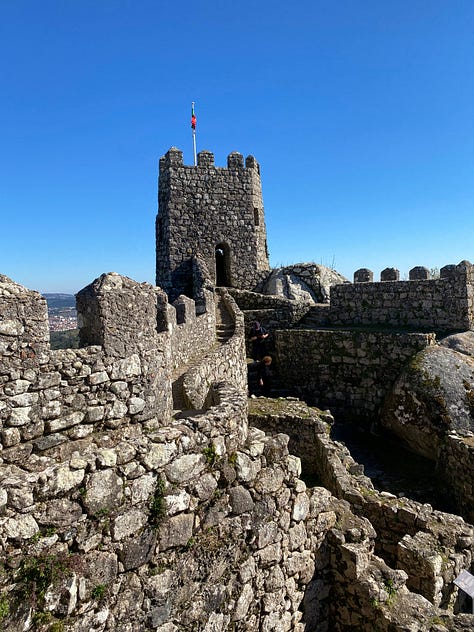
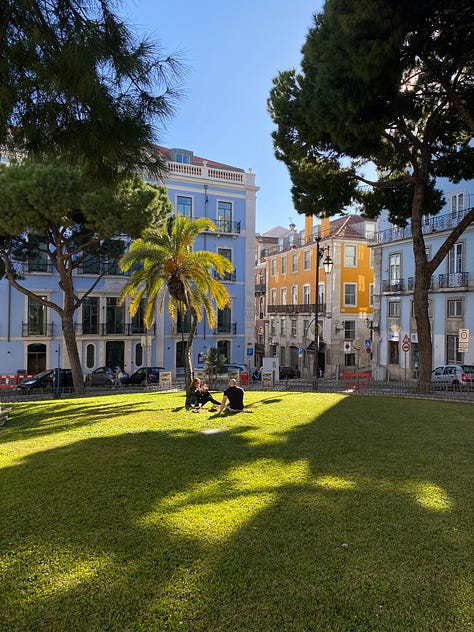
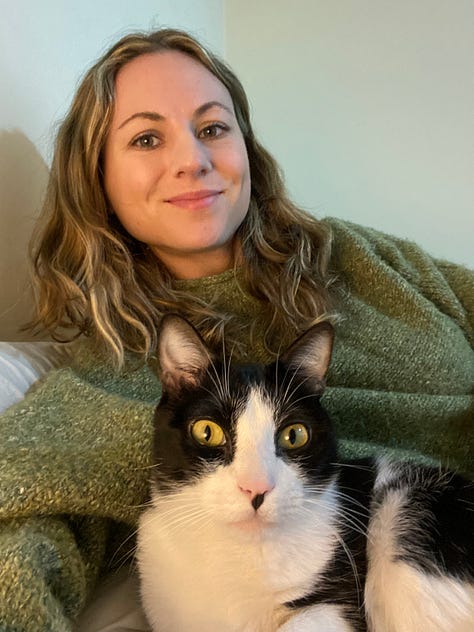

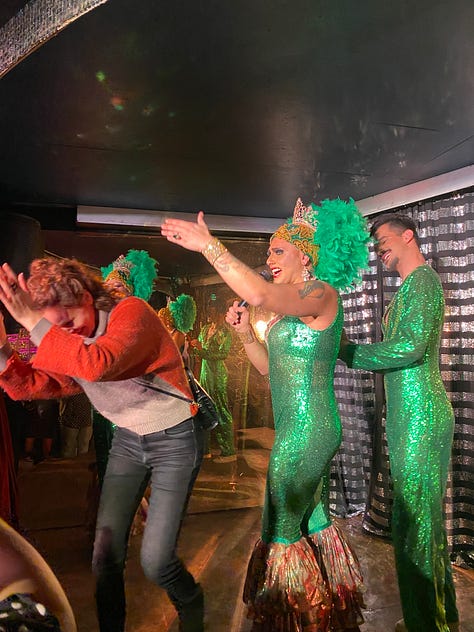
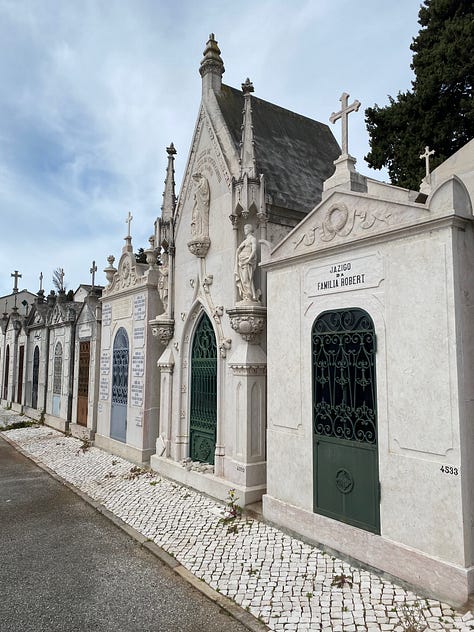
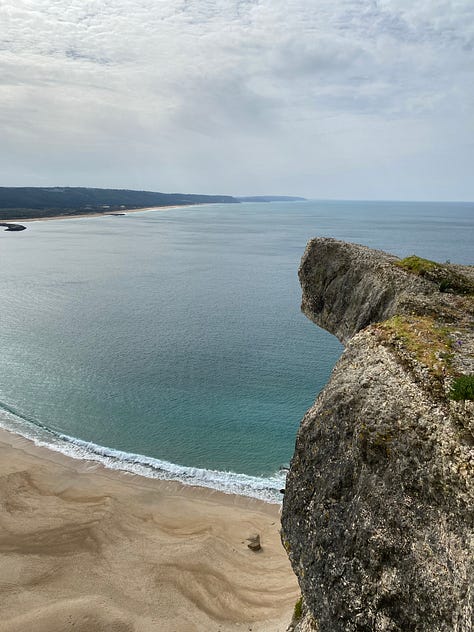
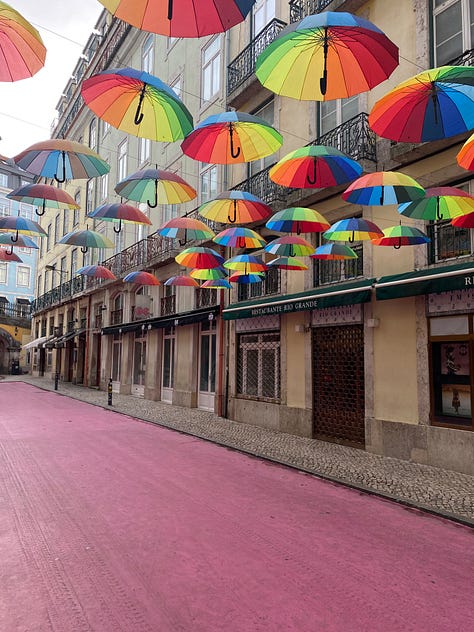
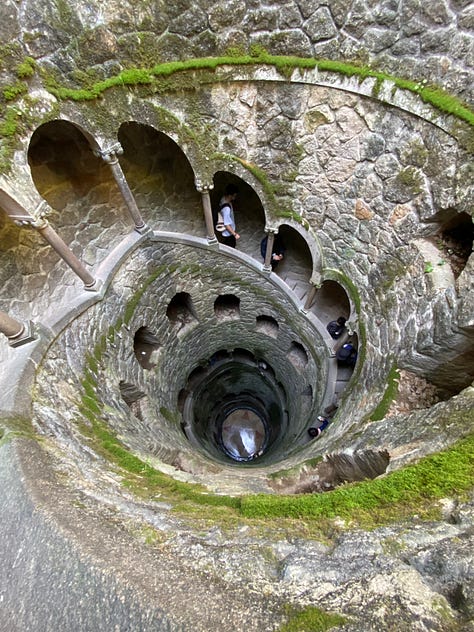
I have no regrets about my time. Every encounter with locals added to my memories in ways that you cannot quantify with money and reviews.
It is a privilege to travel; it is even more of a privilege to be shown the soul of a place and its people.
In some ways, this hectic tourism feels to me like a new form of imperialism. We enter places full of rich history and culture, but all we do is see what we expect to see, spend money, rush, and then return home needing a vacation from our vacation (how many times have you heard people say this?). Unless, perhaps, you spent a week laying on a beach in the Caribbean.
In this travel imperialism, we impose our desires and expectations on a place, without asking what it requires from us. The soul of the popular places we visit are threatened under the way we travel. Locals priced out of homes due to gentrification and AirBnB, small shops turning into McDonald’s to feed people who want to experience sameness in another city; formerly quiet neighbourhoods overrun with cameras and selfies as people pass through without a second glance.
We impose our footprints on a place, but we should allow the place to leave its footprint on us. The next time I have the funds and ability to travel, the footprint of Lisbon and the needs of a city like it will sit at the forefront of my planning.
How can I be a better traveller? How can I visit in a way that is gentler on the local population, their housing situation, and the fragile beauty of historic spots? We can never be entirely ethical travellers in an era of climate change and gentrification, but perhaps we can offer something small: when we experience the soul and beauty of a place, we fall in love with the place. In that love, lays a desire to protect what is precious.
This is travel as relationship over commodification; presentness over hustle culture. This is a way to encourage ourselves and others to value the uniqueness, and fight to help people preserve it.
This is why organizations like UNESCO exist, because countless people recognize that the soul of a place should never be threatened by development and tourism.
Travel can benefit from the concept of quality over quantity.
In our modern pursuits, we tamper with that very soul of places without scraping past the epidermal layer of their body. We hustle our way through our days, seeking a quantity of experiences to consume because that is what we have been taught.
I think that one of the best ways we can honour a culture is to let it consume us. The soul of a place exists in the quality time you spend with it.
If we can spare time, take it. Slow down.
Can we change our world by moving through it in a way that honours relationship and learning over commodification and checklists? And can it change us for the better, too?
If would like to support me, you can buy me a coffee or become a paid subscriber!




